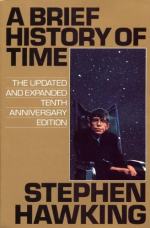|
This section contains 538 words (approx. 2 pages at 400 words per page) |

|
Chapter 3 The Expanding Universe Summary and Analysis
When looking into the sky on a clear night, most of the stars visible to the naked eye are a few hundred light years away. A light year is the distance light travels in an earth year at its constant velocity of 186,000 miles per second—5.88 trillion miles. Our sun is about 8 light minutes away, and the closest star is 4 light years distant. Most of the points of light are stars in our own galaxy, but some are galaxies or clusters of galaxies containing many more stars, and to our eyes the galaxies appear as single points of light.
Edwin Hubble discovers these galaxies in 1924, and by analyzing the light emitting from them, determines that all the galaxies are moving away from the earth, or that is how it seems. The earth is not likely...
(read more from the Chapter 3 The Expanding Universe Summary)
|
This section contains 538 words (approx. 2 pages at 400 words per page) |

|




